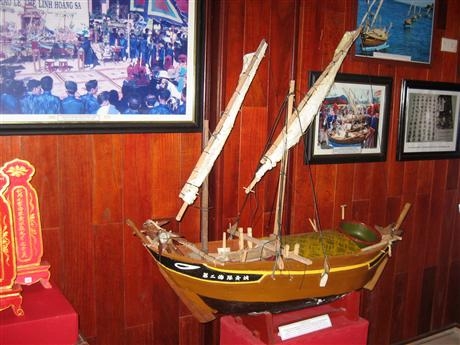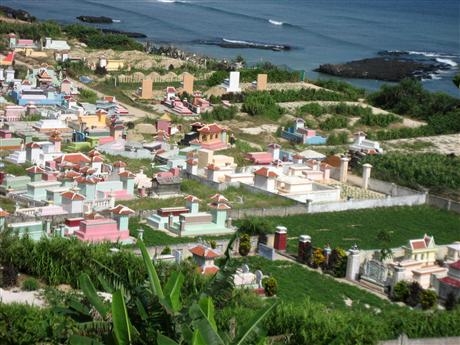|
Prof. Carl Thayer and
Hoang Sa story
VietNamNet Bridge - Prof. Carl Thayer,
from the Center for Defense and Strategic Studies (CDSS), Australia, a
well-known expert on security in Southeast Asia, the East Sea and China, has
been to Vietnam many times to attend international conferences. But, perhaps,
this is the first time he visited a small province like Quang Ngai.

Prof. Carl Thayer
(left) in Quang Ngai.
On April 27, 2013,
At that meeting, Prof. Thayer met his colleagues who
joined him in workshops on the East Sea conflict in Hanoi and Ho Chi Minh
City, such as the Secretary General of ASEAN Rod Severino, Dr. Renato de
Castro from the Philippines, Dr. Subhash Kapila from India, and Prof. Ngo
Vinh Long from the University of Maine (USA).
More specifically, he met Murray Hiebert, a senior
expert of the Center for Strategic and International Studies (CSIS) in
Washington DC (USA), who for the last several years chaired the regular
sessions on the
As a leading expert on
At the workshop in Quang Ngai’s Prof. Thayer’s
presentation on the lawsuit against China to the UN, filled by the
Philippines, perhaps for the first time, was not present, because his
presentation had the same topic with the one by Murray Hiebert and because
the CSIS scholars will continue to chair the two sessions of a workshop on
the East Sea in early June at CSIS.
But Prof. Thayer was not alone because other scholars,
such as ASEAN General Secretary Rod Severino, Dr. Renato de Castro from the
Historical evidence for foreign
scholars

The evidence for
During discussion on the historical evidence, Prof.
Thayer asked all Vietnamese scholars a question: In the process of reading
historical books of
All respondents had very specific answers, Prof. Thayer
said.
For example, there are documents noting that Chinese citizens
went to Hoang Sa, but according to Chinese law at that time, living on such
foreign islands was illegal.
Some documents noted that officials of
Or, the Chinese only went to Hoang Sa during the
fishing season, not entirely settling down there. As for
"Foreign scholars have devoted much time to the
study of historical documents and evidence on territorial disputes in the
For example, Mr. Nguyen Dang Vu, Director of the
Department of Culture, Sports and Tourism of Quang Ngai, presented a very
interesting presentation on King Minh Mang, who issued edicts to send the
Hoang Sa flotilla to Hoang Sa and Truong Sa.
Prof. Nguyen Quang Ngoc of the
"These documents (by Prof. Nguyen Quang Ngoc)
really made me feel enlightened," Prof. Thayer said.
Dr. Nguyen Nha, from the Vietnam History Association,
was excellent in refuting the weaknesses of
According to Prof. Thayer, seminars, such as the one
held at the Pham Van Dong University, are extremely valuable for foreigners,
in the sense of education.
For the first time in Ly Son

Ly
Perhaps Prof. Thayer, along with foreign delegates
attending the workshop, are almost the first foreigners visiting Ly Son
island in Quang Ngai province, at least since China apparently showed its
intention to invade 80 percent of the East Sea through the U-shaped line.
In the eyes of Professor Thayer, Ly Son Island has
provided a demonstration of the practical aspects of a long maritime history
of
Moreover, the purpose of this trip was not for
sightseeing but to participate in the Hoang Sa flotilla memorial ceremony on
the Ly Son Island. This ceremony recreated the history of sacrifices and
victory of the Vietnamese over two centuries ago.
"But, for me, the most exciting event on the
island is the story of two fishermen,'' Professor Thayer said.
A fisherman who brought home a piece of cloth printed
with the words on a rock that he did not understand the meaning after fishing
in Hoang Sa in 1981. It is a stone inscription from the second year of the
Nguyen Dynasty, which provides historical evidence that the Hoang Sa
Archipelago is under the jurisdiction of
The fisherman also told that the Chinese tried to
destroy that evidence.
He also recalled how he was arrested and badly treated
by the Chinese. But, finally, he showed his determination to continue fishing
in the waters of Hoang Sa - the waters under the sovereignty of
The second story was told by the captain of a fishing
boat that was fired upon with flares by Chinese ships on the morning of March
20, 2013 - a story that will be told in the second part of this story.
Huynh Phan
|
Thứ Tư, 5 tháng 6, 2013
Đăng ký:
Đăng Nhận xét (Atom)
Không có nhận xét nào:
Đăng nhận xét